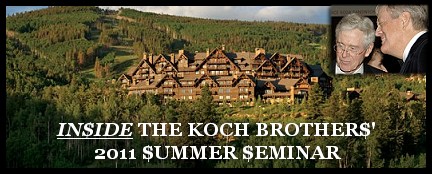Exclusive Audio: Inside the Koch Brothers' Secret Seminar
A close-up view of the oil billionaires' dark-money fundraiser and 2012 strategy session.

During his welcoming remarks, Charles Koch warned his guests that the 2012 elections are nothing short of a battle "for the life or death of this country." He then acknowledged the individuals and families who had given more than $1 million to the brothers' efforts—though he misspoke, saying "more than a billion," earning a huge laugh from the crowd. "Well, I was thinking of Obama and his billion-dollar campaign," Koch said, to more laughter and cheers. "So I thought, 'We gotta do better than that.'" (Forbes pegs the brothers' personal net worth at around $22 billion apiece.)
(The complete audio and transcript of his remarks are available at The BRAD BLOG.)
Charles and David Koch are co-owners of Koch Industries, an energy and chemical conglomerate inherited from their father that is currently America's second-largest privately held company. To date, the brothers have spent more than $100 million supporting hard-right political campaigns and institutions. They are key funders of the movement to discredit climate science and sow doubt on the scientific consensus that human activities contribute to global warming.
The brothers have held their biannual seminars since at least 2003, endeavoring to keep almost everything about them a secret—not just the content but also the identities of attendees and speakers, and even the locations and dates. They've succeeded until recently. Last October, a leaked invite for the Kochs' January 2011 seminar was obtained and published by Lee Fang of ThinkProgress.org. In response, groups including Common Cause and Greenpeace organized a massive protest outside the gates of the resort near Palm Springs where the gathering was held.
[Hmmm…a secret conference. Lot’s of movers and shakers – important people. Sounds like the Koch brothers’ US version of the secret Bilderberg conferences.]
Several GOP governors made it to the Vail seminar in June, among them Florida's Rick Scott, Virginia's Robert McDonnell, and White House hopeful Rick Perry of Texas. News of the event slipped out after McDonnell put the trip on his weekend schedule; neither Perry nor Scott initially disclosed the trip to their constituents. A Perry spokesman acknowledged his attendance only after the Austin American-Statesman tracked the tail number of a plane belonging to one of the governor's top donors from Texas to Colorado. He described the summit as a "private gathering of business leaders."
Rest of Part 1 the article:
http://motherjones.com/politic...others-seminar-tapes
Part 2:
http://motherjones.com/politic...och-brothers-seminar

